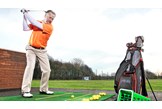Reflect on your season
Published:
As the golfing season draws to a close, we can reflect on our achievements. They say the definition of madness is repeatedly doing the same thing while expecting a different result. If 2014 did not produce the improvement in your game that you had hoped for, try to do something fresh and positive this winter. Here, I want to help you reflect on the past year, learn from your mistakes and embark on a simple, measurable plan of action to improve.
Examine the evidence |
I would urge you to keep a record of how many fairways you hit, how many greens in regulation and the number of putts you take in a round. If, for example, you hit 11 out of 14 fairways but only hit six greens a round, it stands to reason that your approach shots need improving. No point blasting driver at the range if it’s your iron play letting you down. With the benefit of hindsight, you can analyse your last couple of rounds and make a start by identifying and working on your current weaknesses. |
Manage your misses |
No, not marital advice, but how to make the most of your approach shots. Your ability and handicap will determine how many times you hit a green in regulation; whatever your skill level, it’s the quality of your misses that will govern your scores. The old adage “a golfer is only as good as his worst shot” is one that holds true. Tour pros, on every shot, take into account where a mishit might finish; the last thing they want is to “short side” themselves with little chance of scrambling a par. If there is a long, low index hole, just within your range, accept the fact and play for position. You will be surprised how often you get up and down for par and pleased you have fewer disasters. |
Don’t search for perfection |
Scoring well, when hitting the ball sweetly, is easier for all of us. Consistent scoring comes from managing our game when our timing is off. Jack Nicklaus said he was able to win many tournaments by accepting the fact that pressure would make him mistime his shots. In other words, he knew how to “win ugly”. Nicklaus’ record in Majors is made even more remarkable by the vast number of runner-up and top five spots he achieved. |
Play for position off the tee |
Peter Alliss once said: “When driving into the wind, don’t hit it harder – hit it better”. It’s a great piece of advice that you can apply to all your tee shots. If your best tee shot goes 240 yards and your indifferent drive goes 210, those 30 yards are not as significant as being 30 yards off line. |
50% of practice from 60 yards in |
No matter what your level of ability, if you never take more than three shots from 60 yards in, your scoring will become more consistent. Another advantage of short game practice is it is an ideal environment to work on the basics of grip and posture. |
On reflection |
Look back on your season and be honest with yourself. Do you know how many fairways you hit, greens in regulation and number of putts? If not, how are you going to improve your weak areas or consolidate your strengths? It only takes a minute or two after every round and will enable you to practice intelligently and effectively. Start to plan and prepare for next season by booking a nine-hole playing lesson with your local PGA pro. He can assess your game and give you a plan of action to work on: follow that with at least one lesson a month over the winter and you will definitely see an improvement in your game. |

